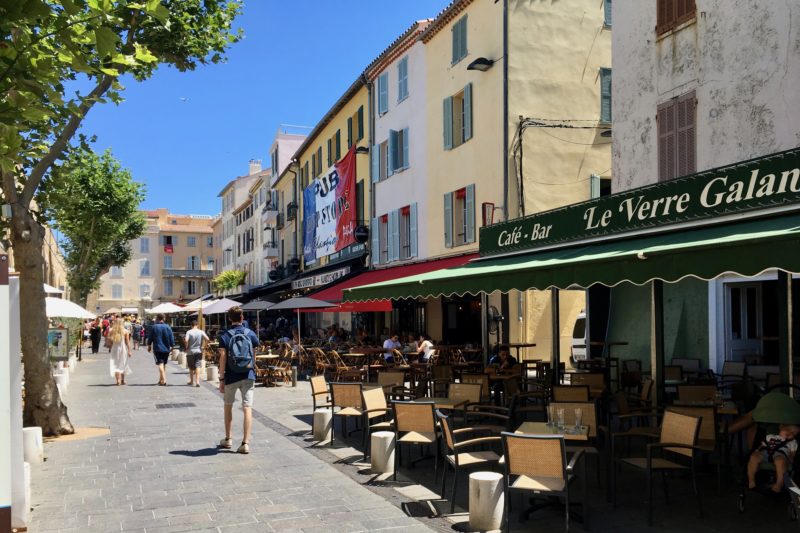“Moi, je veux prendre le penne au pistou,” Lolo says to the waiter in fluent, properly French-accented French. Her order is no surprise. Pesto penne is one of my 13-year old’s favourites.
The wiry waiter turns his gaze to Philippe, who sits beside me at this restaurant spilling into Boulevard d’Aguillon, a busy pedestrian street in Antibes. “Je vais prendre le linguinis aux fruits de mer,” he says in decisive French, fluently requesting the seafood linguini even if his pronunciation isn’t exactly local.

The waiter nods and finally looks at me. “Je veux prendre le pavé de saumon,” I say in my I-began-learning-aged-35 French.
“Zhe salmon,” the waiter says back to me. In English. “Okay,” he says, and off he trots to the kitchen.
Lolo thinks it’s hilarious. Philippe says I’m doomed for the rest of my life. I simply groan. Why, once again, did a local person feel it necessary to translate my own, perfectly understandable, Anglo-accented French back to me in English? As if I didn’t understand what I was saying?
My accent is a favourite party gag within my tiny family. Now and then, the three of us will be speaking French together in our various accents when someone will ask, “How do you know each other?” Somehow I always end up the butt of the joke.
Lolo mocks my impossible French. My new teenager is remarkably consistent. Just as the penne au pistou is an established favourite, so is the topic of my Anglophone accent. My daughter began learning French in her earliest days, many of them right here in France. Her diction is perfect – perfectly French. I can still outrun her in vocabulary, but that’s unfair. I’ve lived a bit longer than she has.

Philippe’s native French, on the other hand, comes from Quebec, but he can turn his French-Canadian accent up or down as he chooses. Often times people don’t know where he’s from. He’s not from here in the South of France. He’s not from Paris. Many folks guess he’s Belgian.
Philippe tempers Lolo’s criticism of my French. Mom’s grammar is “pas mal,” he says. Then he turns to me and continues with typical delicacy, “but no one will ever take you for a native.”
I recognized a growing problem a couple years ago when Lolo and I walked home together from her school. I said something to her in French – who knows what it was exactly, but it was a simple phrase like “Comment était la journée aujourd’hui?” How was the day today?
“Your accent is so bad,” Lolo said, perfectly cutting down my French and evading my question in a single swipe.
“Comment était la journée aujourd’hui?” I said again. “What’s wrong with that?”
“Everything!”
“Okay, then, you say it.”
Lolo’s voice became full but light, almost caressing its words. “Comment était la journée aujourd’hui?”
“That’s exactly what I said!”
“No, you said . . . , “ and here my little instigator repeated the same phrase, flattening all her vowels and imitating the looser, Anglophone accent.
She was right. That was exactly what I’d said. Our little tête-à-tête, walking home one afternoon from Lolo’s school – her primary school, I must emphasize – has put me on guard ever since.
Now a fully-fledged adolescent who has embraced the right to question her faultless parents, Lolo has begun to call me out on my accent. She picks up on situations so common to me that I no longer recognize them. One such incident happened as we shopped for that famous swimsuit for her.

“Nous cherchons un maillot de bain,” I said to the assistant on entering the swim shop. We’re looking for a swimsuit.
“Iz it for you?” She replied, in English.
“Non,” I said, trying to pick up again in French when Lolo jumped in and finished my thought in her perfect diction. The swimsuit was for her, she explained.
As Lolo battled swimsuit options in the change room, I waged war with the friendly clerk, trying to shift our conversation back into French. Between Lolo and me, only my kid succeeded. Light years later, we emerged from the shop, bag in hand, and my daughter gleefully offered her assessment.
“Your French is so bad that people always switch into English!” she said.
It was hard to argue. But progress (and personal devastation) are never linear. I suppose that’s what keeps me going. It wasn’t long after the swimsuit incursion that I got a little pumped up again about how far I’d come, linguistically speaking. The other day a young Frenchwoman asked me at the grocery store, “Savez-vous où est le beurre?”
I hadn’t yet shopped for my dairy products, so I said, “Non, je ne l’ai pas encore trouvé, mais je . . .”
“Oh,” she said, “do you know where zhe buhtter iz?”
I began again. In French. “Non, I haven’t found it yet, mais je pense qu’il est là-bas,” I said, pointing toward the dairy section at the end of the aisle.
The young woman clearly understood my French, and a few minutes later she strolled by me again with butter in her basket. “Oui, il est là-bas,” she said. In French. I had a private celebration beside the yogurts.

The biggest problem, I find, is keeping my brain switched on. Sitting back, lolling in comfort as I wait for French words to seep magically into my brain, is an extravagance I can ill afford. The easiest French interaction for me has to be ordering my family’s lunch at Chez Josy, a snack kiosk on the beach near Bellevue. Dozens of times I’ve waited in the shop’s impressive queue, and when I finally reach the window, I always order the same thing: a plain hotdog and a pan bagnat (basically a salad Niçoise on a bun), cut in two.
Recently when my turn at Chez Josy’s window arrived, I had a brief deer-in-the-headlights moment before recovering. “Un hotdog nature,” I began. Un OT-dog na-CHUR.
One hiccup, though, and the whole machine rolls off the tracks. “You canna speek een English,” the server said. He was charming, but it wasn’t what I wanted to hear.
“Oui, je peux, mais je ne le veux pas!” Yes, I can, I told him with a smile, but I don’t want to! Beside me three young Frenchwomen, each tattooed from ear to heel, cheered.

I finished my order with un pan bagnat coupé en deux and returned with lunch to Bellevue. “It’s not ‘un,’” Philippe said. “It’s ‘uhn.’” He pronounced the same word without much of the ‘n.’ “That was their tip-off right there. From the first word!”
This is my life en français. My grasp of the blessed language of Molière may be pas mal, but I have trouble practicing it in town – and I have anything but a cheerleading squad back home.
At the restaurant on Boulevard d’Aguillon, Philippe, Lolo and I enjoy our pasta and salmon dishes. Eventually my husband asks for l’addition, and together we make our way back through the restaurant’s cluster of tables to the pedestrian street.
“Merci, au revoir,” I say to our waiter on the way out. The night presses on – it’s nearly 10:00 p.m. – but I want to thank the young man for his attentive service.
The waiter nods at my words. He wishes me his own words in farewell. “Have a good day!” he says.


Your stories warm my heart!!!! Teenagers feel it’s their prerogative to correct their mother.
Don’t worry about it, it’s great that you work hard at it and it is charming to hear… no doubt!.
One summer when I was studying in France, one of the teachers told me I had a very strong accent. 🙁 By high school, when I also started learning Spanish, apparently I started speaking French with more of a Spanish accent, oops. I have often wondered why they switch to English even when they clearly have understood what I said in French — je peux, mais je ne veux pas, non plus! Love your posts. 🙂
I know just how you feel! I’ve been in Uzès since Oct. and my French is horrible, but I’m taking lessons and trying. I hate it when they speak in English before I even open my month and I don’t think I look THAT American! Every day is a new adventures. Love your blog.
Let’s turn it around a bit. I suspect the French people are wanting to practice their English and you are the perfect candidate!
Terrific story line again !
Love this!
Oh, how I wish I had even a bit of your language (and writing) skill! Thank you! Have a wonderful summer 💗
A very amusing read. Loved the last paragraph and the butter story…enjoy your little victories. Your perseverance is to be admired. As the Romans say nolite te bastardes carborundorum.
Loved this post–so warm and funny and spot-on. I echo the admiration for your persistence in mastering the language and the accent. Hourrah!
Lol! I think you’re amazing for all the effort you put in. Keep at it. You’ll get there. I love reading your stories! Keep them coming. Xx.
oh so many cases of “but that is what I said!!!!” I cannot begin to list them, doubly infuriating when repeated in perfect french by offspring, which is then understood perfectly and said french person then looks to said child for “translation” when I say something else.
Oh, this is so spot on, Melanie! Love it. I might just try to weave this idea into my next post – because it is totally appropriate and relevant! Thanks, as ever, for piping into the convo. xoj
J’aime bien ton accent! 🙂
et moi aussi, je pense que ton accent français est parfait!!!
Oh my gracious!! When I see Lolo and Phillipe, will be sure to mention that they should “lighten up” on their mother and wife 🙂
As a Brit I solved this problem long ago: I speak loudly and slowly in English. There’s no way that any French person will ever treat my French as anything more than awful, so I don’t bother trying.
Hahaha – there’s always ONE! 🙂
I WOULD LIKE A LARGE GIN AND TONIC PLEASE.
YES, IN THAT GOLDFISH BOWL.
THANK YOU.
😀😊😊
I don’t think it’s your accent at ALL (which is beautiful by the way)! Rather your wide smile, easy friendliness and open expression! That tips them off no matter what you say or how you say it! oxoxo
Les Français sont le seul peuple au monde à mépriser ou à se moquer de l’accent des étrangers qui font l’effort de parler leur langue. Il n’y a rien à faire, c’est dans leur DNA. La seule manière de leur “rabattre le caquet” (expression qui veut dire : remettre quelqu’un à sa place) est de répondre avec emphase “oh mais votre anglais est sûrement bien meilleur que mon français”. Déguster la réaction.
J’apprends l’allemand depuis quelques années mais mon accent est encore très “french” .Contrairement aux Français, les Allemands trouvent cela très romantique, très littéraire. C’est plus sympathique et stimulant, non ?
Ne te décourage pas … ni les autres contributeurs à ce blog qui font l’effort d’apprendre le français.
Now that’s a clever idea for a comeback in the right situation: “Oh, but your English is surely so much better than my French…”
PS : il me revient en mémoire que, dans les années 80, mon beau-père d’alors, David Jonathan Grossman, a obtenu le Grand prix de la traduction française pour sa traduction de “The Big Room” de E.E. Cummings, en français sous le titre de “La Chambrée”. Américain, il ‘s’était engagé pour délivrer l’Europe du nazisme et avait appris le français sur les champs de bataille. Il a épousé une française, s’est établi en Italie (parlait aussi parfaitement italien) puis en France. Malgré sa connaissance exceptionnelle du français il a gardé toute sa vie un solide accent américain qu faisait partie de son aura.
So Jemma… l’accent n’est vraiment pas un problème.
I know the feeling. When I speak French, people answer in English. When I speak English, people answer in French…
Great reading, as always.
Thank you, Jemma, for feeding us so well with those interesting and colorful comments.
I think that you are doing great with your French, because everybody knows that because of the genders and all the very complex grammatical and conjugation that it brings, the French language is much more difficult to learn and use than the English language. Even the French Canadian have often a hard time being well understood by the French people, especially in the southern part of this wonderful country.
But it worth the effort because it’s so much more pleasant to be able to order and eat an exquisite crêpe salée au canard confit, avec béchamel than a cheeseburger. lol
Je ne me souviens pas qui a dis ” Sans la langue française il n’y aurait pas eu de French kiss”
Bonne vacance Sylvie et Jacques
As someone who can completely relate to the situation being pegged a foreigner even before opening her mouth, I would think they are venturing an assumption that you’re an English speaker; how readily they’d switch back to conversing en francais if you were to go on in some obscure language say Mongolian or Swahili. However, if you have the misfortune of being answered in either of those, I’m afraid le chat est sorti du sac. Your blogs enchant and transcend.
Pour te consoler a propos de ton accent ,dis toi qu’il n’y a pas plus sexy qu’une femme qui parle la langue de Molière avec l’accent de celle de Shakespeare.Parle en a Philippe, je suis persuadé qu’il est du même avis .Les Français perdent une belle occasion d’apprécier ces charmantes conversations.
Made me laugh. I know the feeling all too well. But at least you’ve got courage (which I lack!). Anyway, I agree with Jacques’s last post.
Oh I can only imagine your frustration! But, keep at it bonne courage.
Oh my Jemma, I twisted inside with empathy as I read every reproach of not pronouncing properly…for me, it’s my Mandarin. My daughter and son can speak flawlessly ( at least that’s what I’m told ) and both cringe when I even attempt. “ Mom, please, not now!l” as we approach the TNT cashier. Lol…but let’s soldier on!!